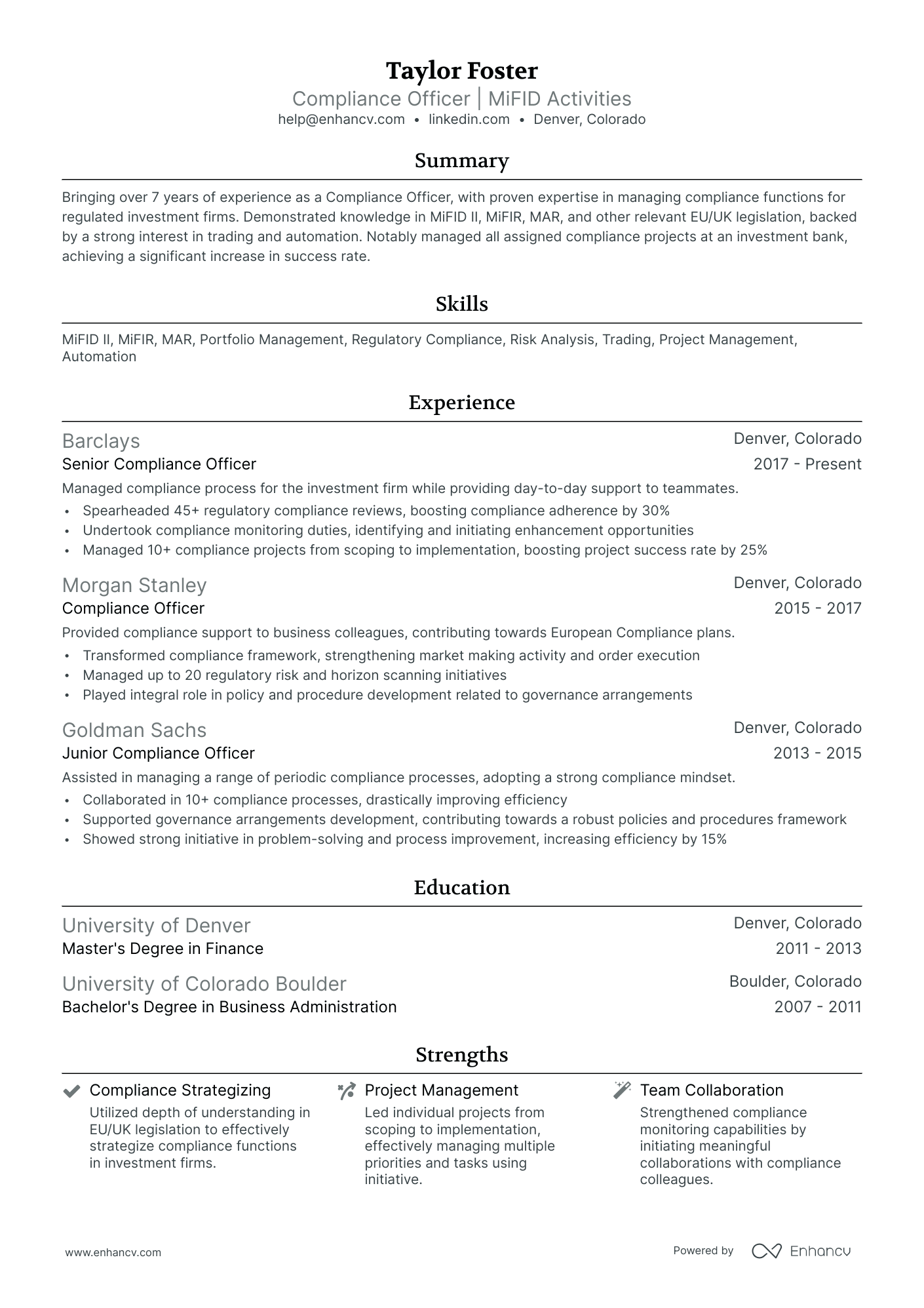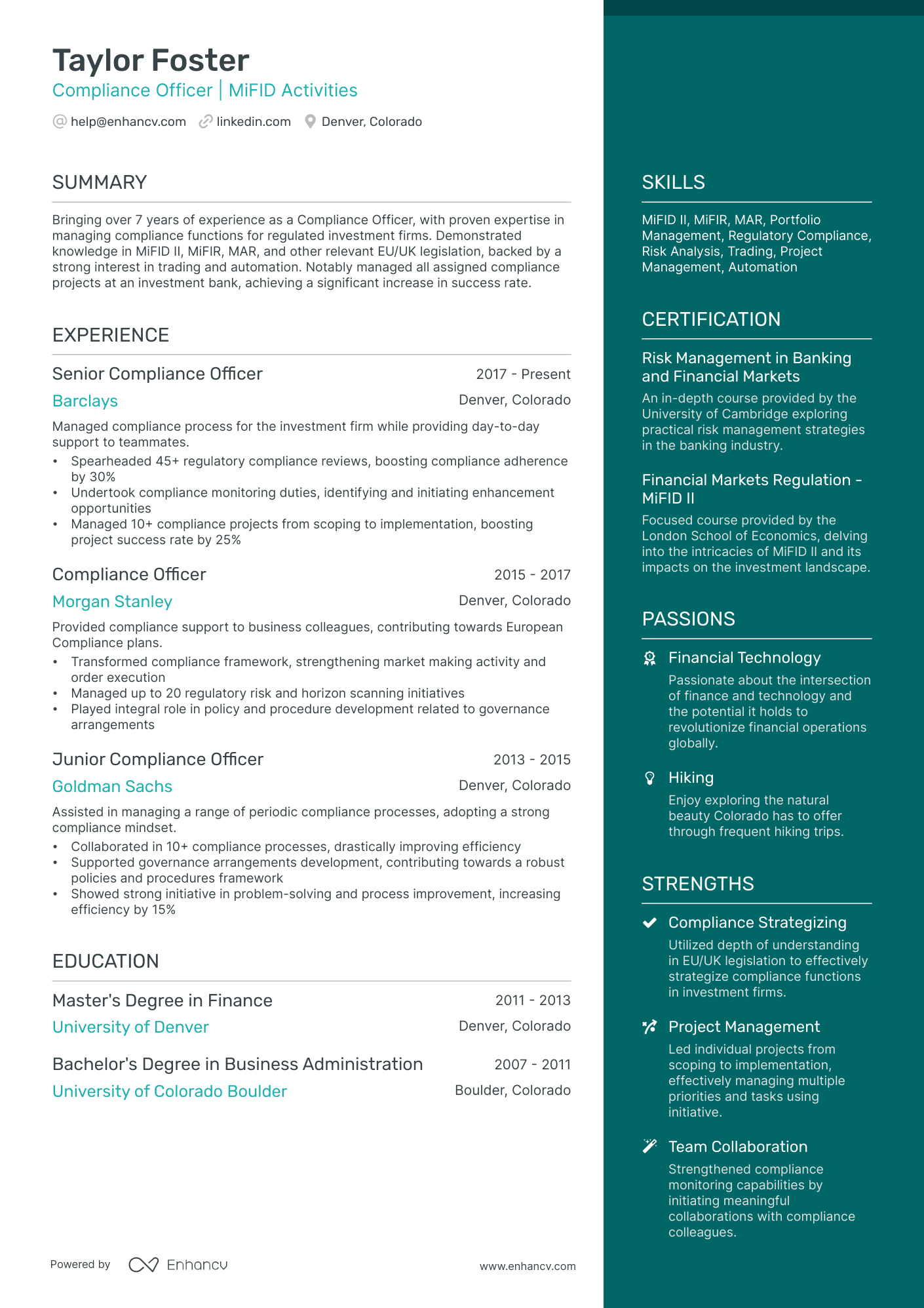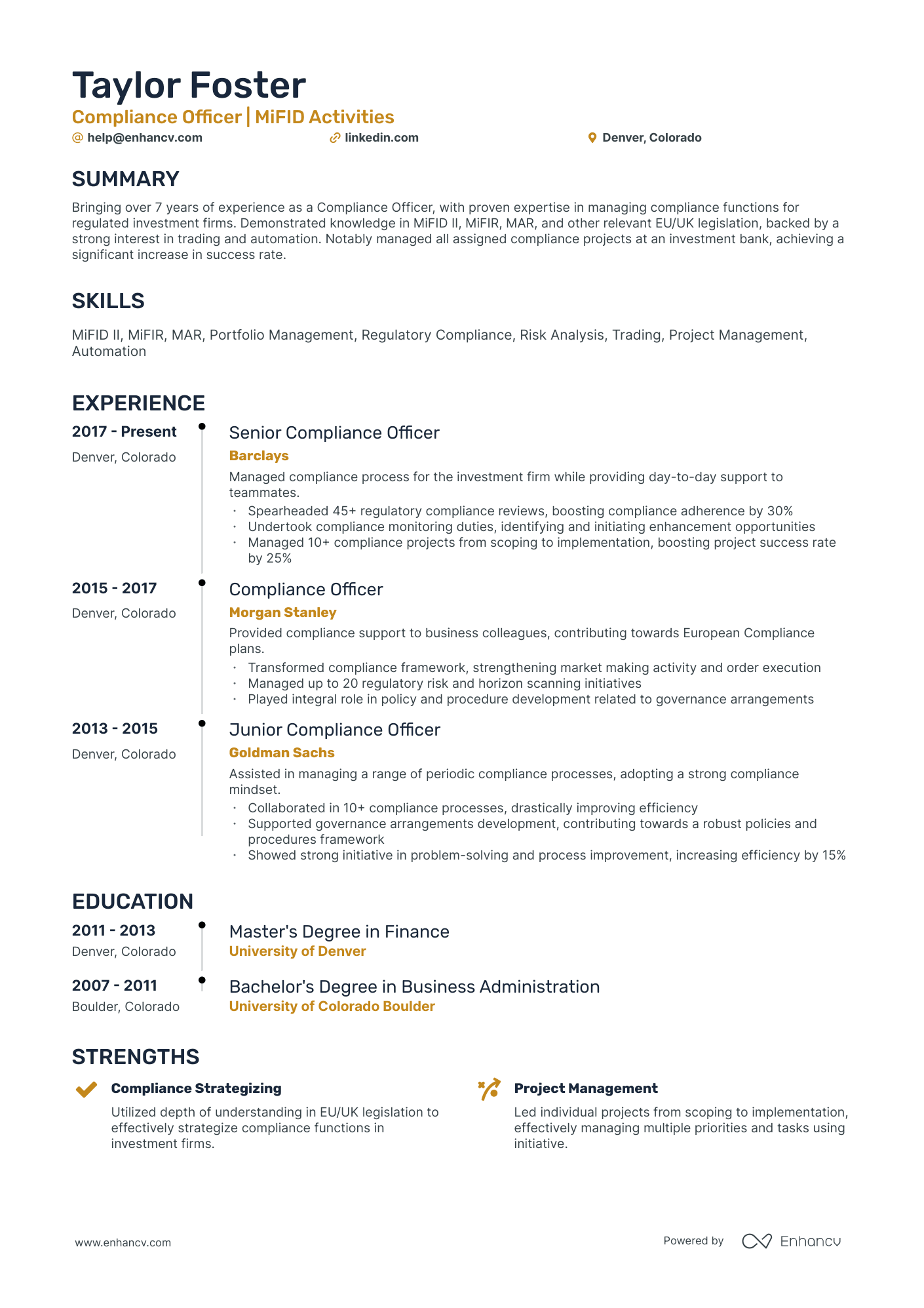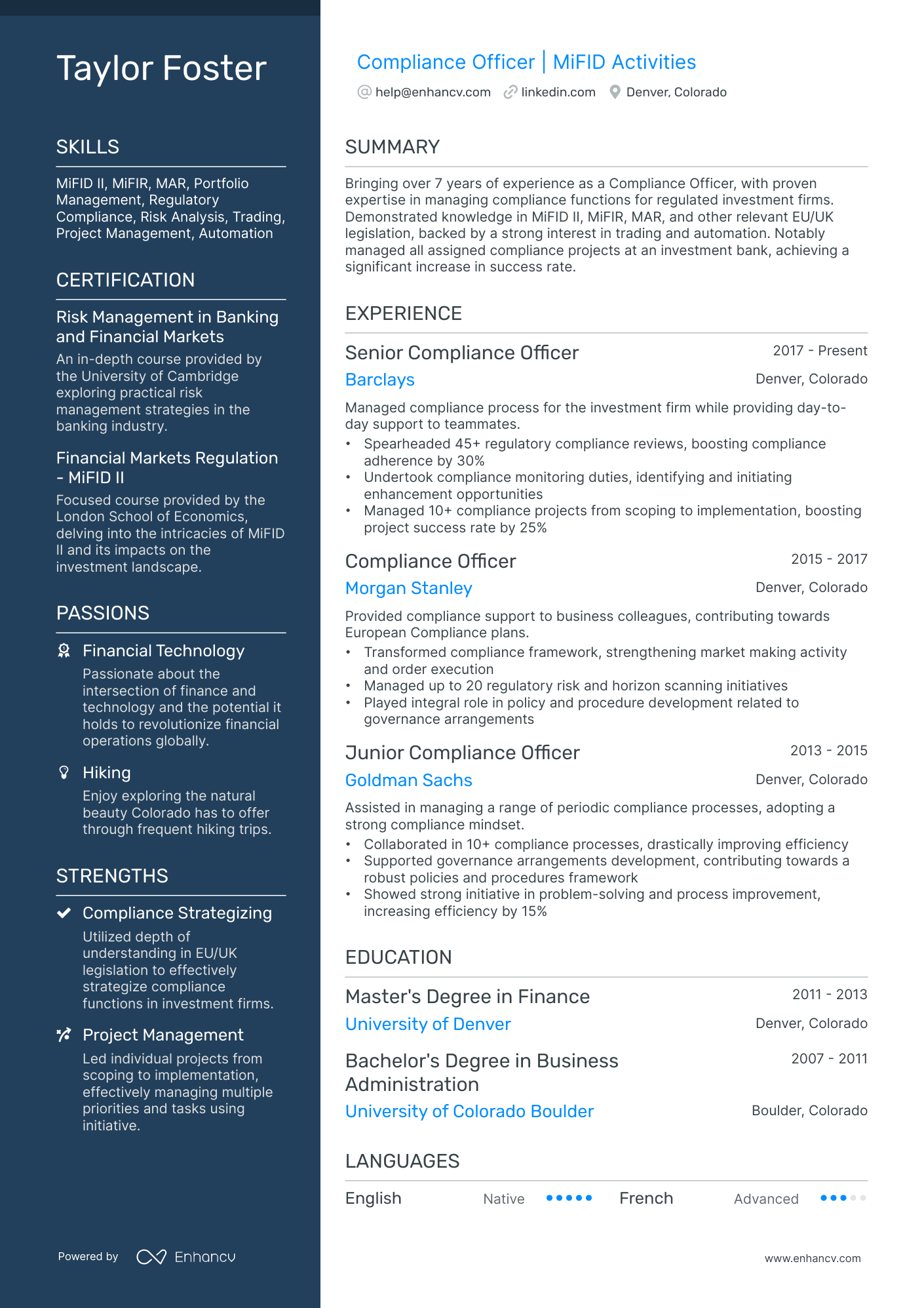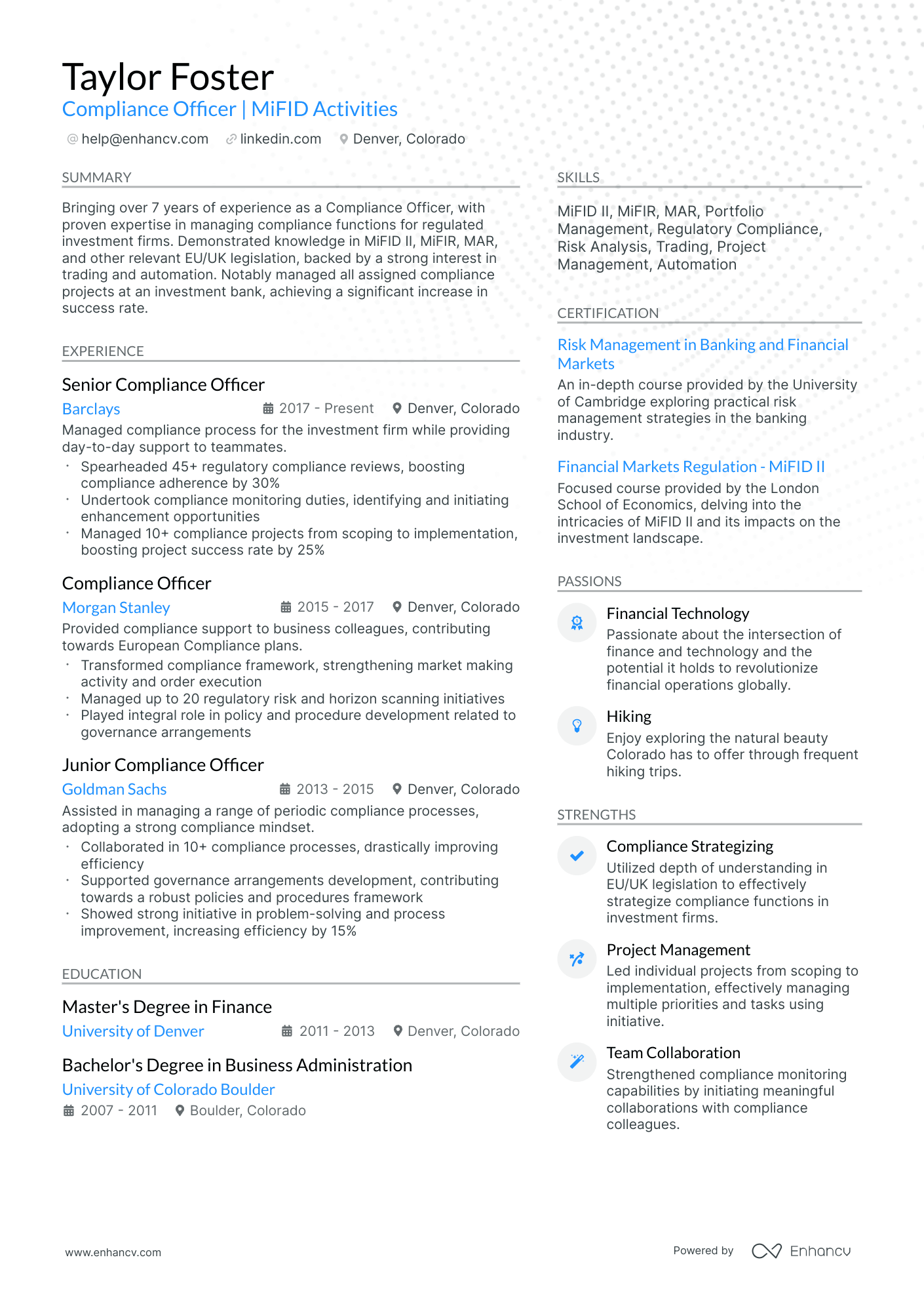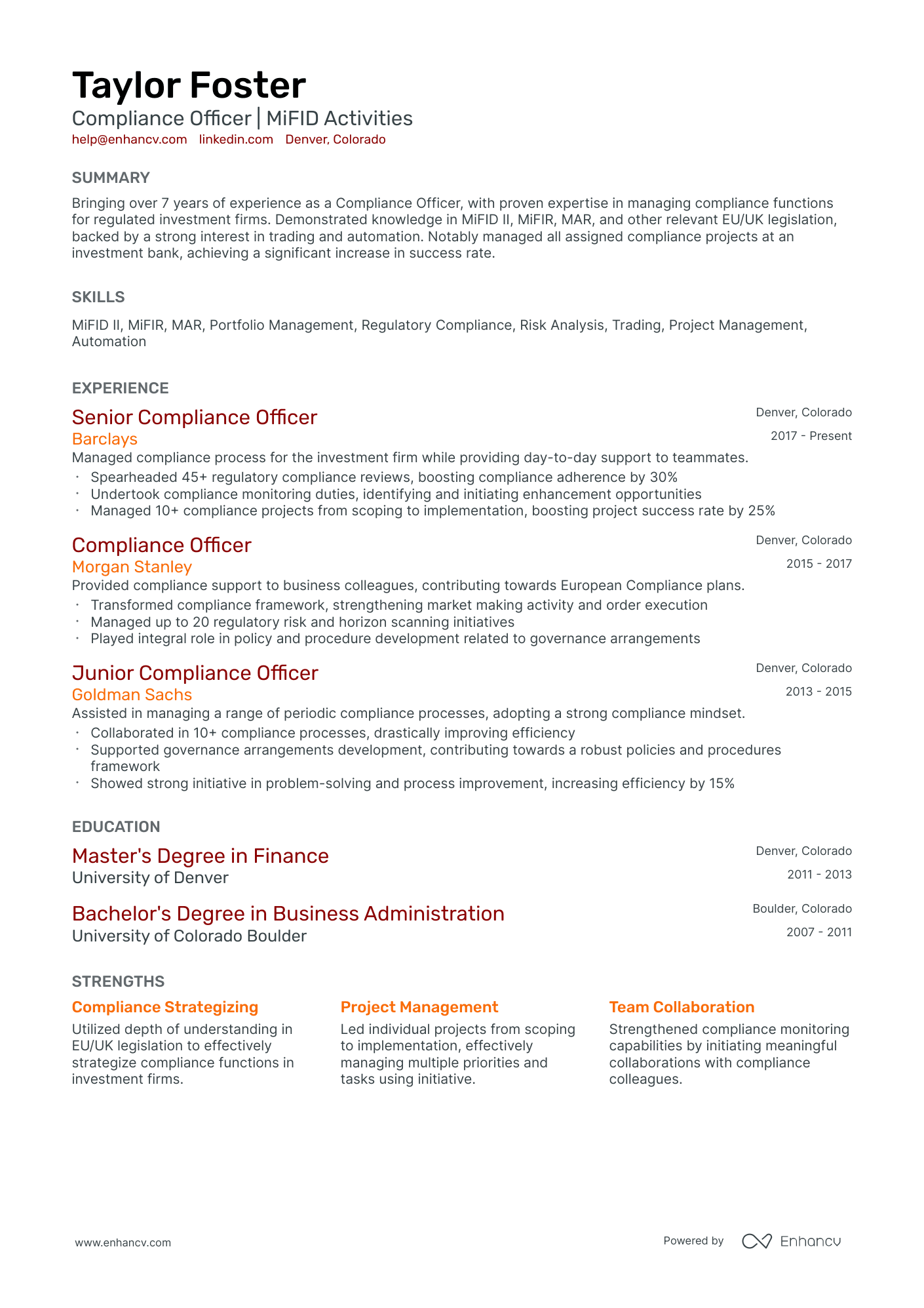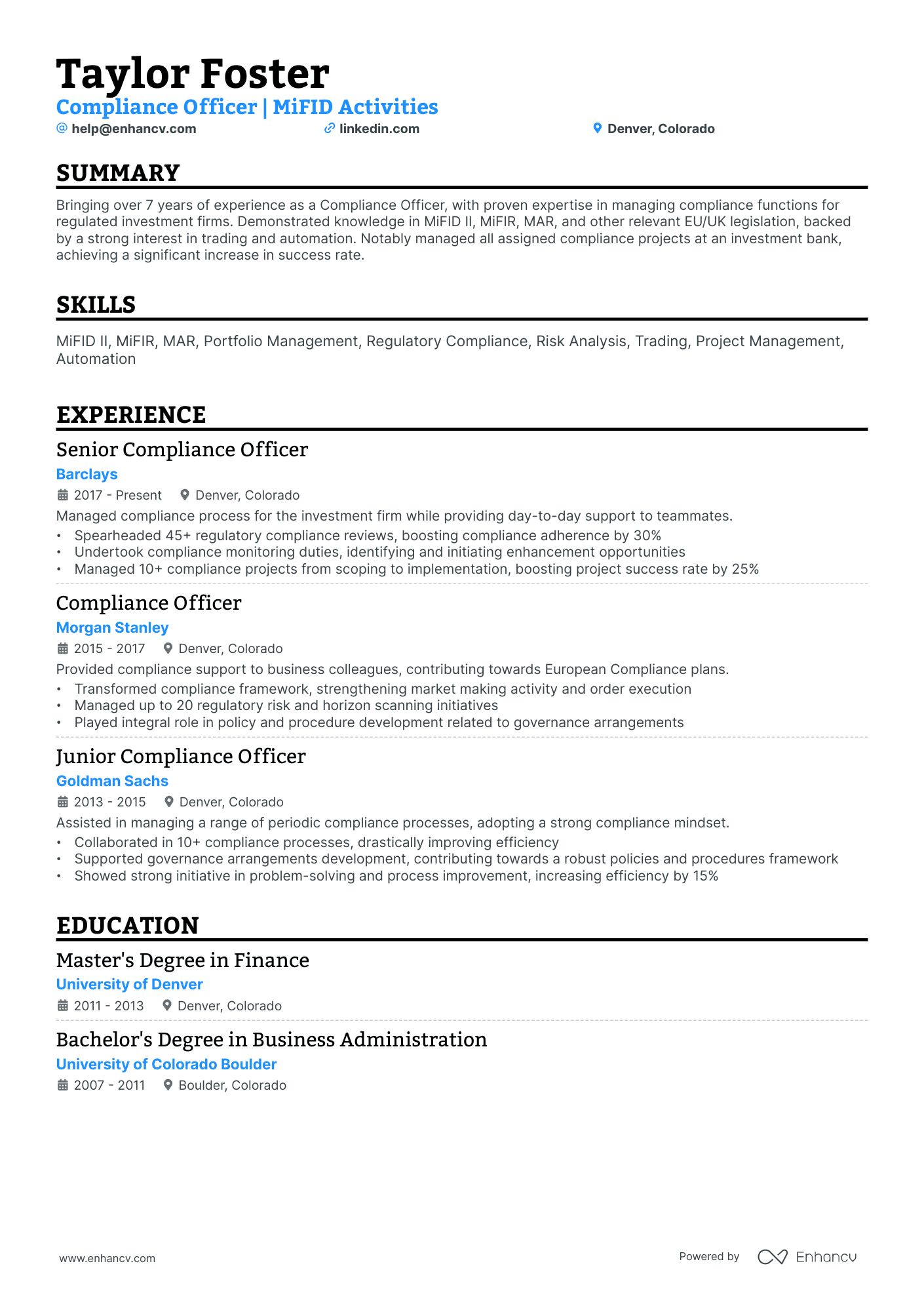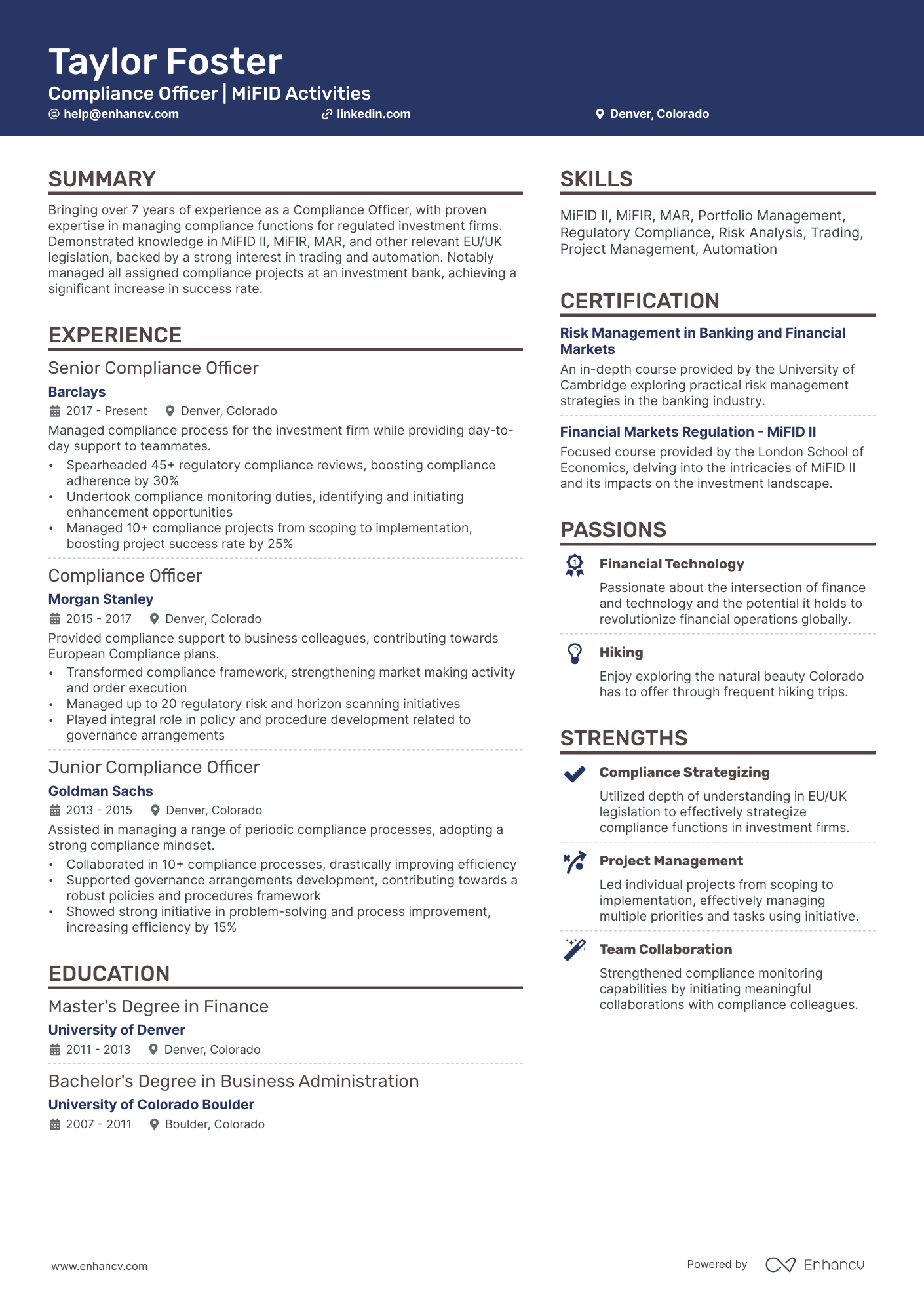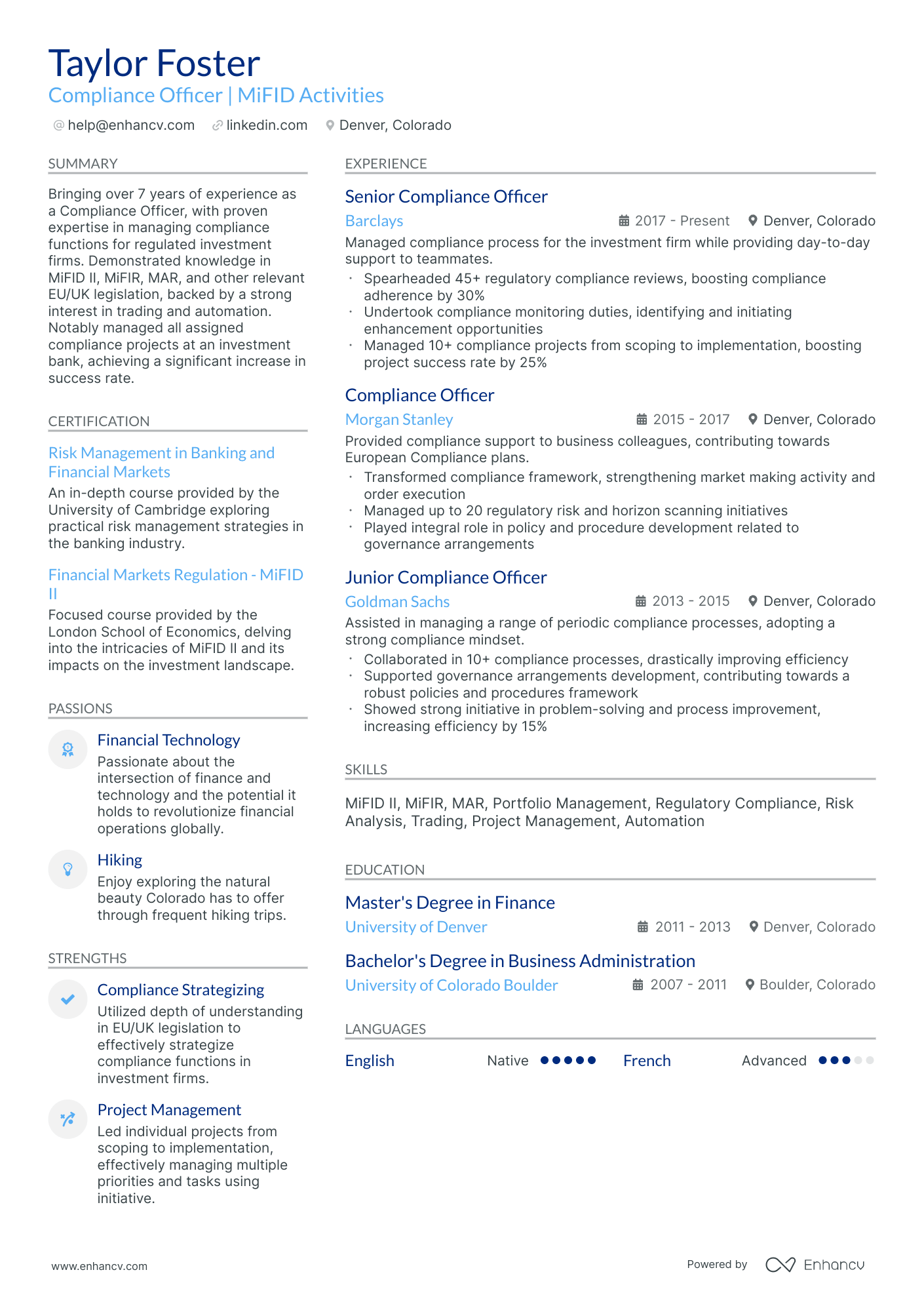A significant resume challenge faced by compliance officers is effectively demonstrating their ability to navigate and ensure adherence to complex regulatory requirements across multiple jurisdictions. Our guide can assist by providing practical tips on how to highlight such expertise, including the use of action verbs, inclusion of specific accomplishments, and clear articulation of your role in implementing compliance programs.
Here's what you'll read within our professional resume guide:
- Compliance officer resumes that are tailored to the role are more likely to catch recruiters' attention.
- Most sought-out compliance officer skills that should make your resume.
- Styling the layout of your professional resume: take a page from compliance officer resume examples.
- How to write about your compliance officer achievements in various resume sections (e.g. summary, experience, and education).
Recommended reads:
crafting an impeccable compliance officer resume format in four steps
Your compliance officer resume format should be both strategic and reader-friendly. Here's a concise guide to help you achieve that:
- Choose a format that aligns with the job's requirements. If your expertise is directly relevant, the reverse-chronological format is ideal. If you're focusing more on skills, consider the functional or hybrid formats.
- Header: Ensure it's populated with accurate contact details and any relevant portfolio links.
- Length: A one-page resume is standard, but if you have extensive experience, extending to two pages is acceptable.
- File type: To maintain formatting consistency, always opt for PDF.
Targeting Canada? – Keep in mind their resume layout may differ from others.
Upload your resume
Drop your resume here or choose a file. PDF & DOCX only. Max 2MB file size.
Pro tip
Keep your compliance officer resume clear and concise. Top professionals narrate their career stories while highlighting their strengths.
To craft a compelling communications officer resume, focus on these sections:
- A scannable header
- A snapshot of your professional persona, showcasing soft skills, achievements, and a summary or objective
- Skills that align with the job advert
- Quantifiable achievements in your experience section
- An education and technical skills section that underscores your proficiency with specific tools or software
What recruiters want to see on your resume:
- Regulatory knowledge: Deep understanding of relevant regulatory requirements and laws in the organization's industry.
- Risk assessment abilities: Skills in identifying, evaluating, and mitigating compliance risks.
- Policy development experience: Proven track record in developing, implementing, and maintaining effective compliance policies and procedures.
- Communication skills: Strong ability to clearly and effectively communicate complex legal and compliance issues to various stakeholders.
- Investigation & audit experiences: Demonstrated experience in conducting internal audits, investigations, and ensuring corrective actions for compliance violations.
Recommended reads:
Strategies for crafting your compliance officer resume experience section
When detailing your compliance officer resume experience, it's essential to pair responsibilities with tangible achievements.
Consider including:
- Key responsibilities, emphasizing their significance to your role, team, or organization.
- Experiences that have fostered your technical acumen or professional growth.
- Metrics that underscore your contributions and successes.
- Challenges you've addressed and the solutions you've implemented.
- Strategies you've devised and their measurable impact on growth.
Your experience section is pivotal in making a lasting impression on recruiters. To inspire you, we've curated real-world compliance officer examples:
- Conducted regular audits to ensure compliance with industry regulations and internal policies, resulting in a 20% increase in overall compliance.
- Developed and implemented a comprehensive compliance training program for employees, reducing compliance violations by 15%.
- Collaborated with cross-functional teams to investigate and resolve compliance issues, ensuring adherence to regulatory requirements.
- Researched and interpreted federal and state regulations to ensure compliance with changing legislation.
- Performed risk assessments and developed strategies to mitigate potential compliance risks.
- Led a team of compliance analysts, providing guidance and support in implementing compliance programs.
- Implemented an automated compliance monitoring system, reducing manual errors by 30%.
- Conducted internal investigations into suspected compliance violations, resulting in improved controls and prevention measures.
- Provided compliance training to staff members, increasing awareness and ensuring adherence to regulatory standards.
- Collaborated with legal team to develop and update compliance policies and procedures.
- Conducted due diligence reviews on third-party vendors, ensuring compliance with company standards.
- Prepared and submitted regulatory reports to governing bodies within specified deadlines.
- Conducted periodic compliance audits on various business units, identifying and addressing non-compliance issues.
- Assisted in the development and implementation of an anti-money laundering program, resulting in a 25% reduction in suspicious transactions.
- Collaborated with external auditors during regulatory examinations, ensuring compliance with audit requirements.
- Developed and maintained compliance policies and procedures aligned with changing regulatory landscape.
- Conducted regular risk assessments to identify compliance gaps and implemented corrective actions.
- Provided training to employees on compliance-related topics, fostering a culture of adherence to regulations.
- Performed compliance monitoring activities, including reviewing transactions and conducting internal investigations.
- Developed and led compliance awareness campaigns, resulting in a 30% increase in employee knowledge and understanding.
- Implemented a whistleblower hotline system to improve reporting of potential compliance violations.
- Conducted compliance risk assessments and recommended control enhancements to mitigate identified risks.
- Developed and implemented a vendor management program, ensuring compliance with contractual and regulatory requirements.
- Collaborated with internal audit team to evaluate the effectiveness of compliance controls.
- Managed the compliance monitoring process, resulting in a 15% reduction in compliance violations.
- Developed and delivered compliance training materials for employees at all levels of the organization.
- Coordinated responses to regulatory inquiries and examinations, ensuring timely and accurate information submission.
- Reviewed and revised compliance policies and procedures, aligning them with industry best practices.
- Conducted compliance audits and assessments, identifying areas for improvement and implementing corrective actions.
- Assisted in the development of compliance-related training programs and conducted training sessions for employees.
The following content includes information from "O*NET OnLine" by the U.S. Department of Labor, Employment and Training Administration (USDOL/ETA). Used under the CC BY 4.0 license. The data represents the top responsibilities present on the task lists for compliance officer professionals.
Top Responsibilities for Compliance Officer:
- Warn violators of infractions or penalties.
- Evaluate applications, records, or documents to gather information about eligibility or liability issues.
- Advise licensees or other individuals or groups concerning licensing, permit, or passport regulations.
- Prepare reports of activities, evaluations, recommendations, or decisions.
- Report law or regulation violations to appropriate boards or agencies.
- Confer with or interview officials, technical or professional specialists, or applicants to obtain information or to clarify facts relevant to licensing decisions.
- Issue licenses to individuals meeting standards.
- Collect fees for licenses.
- Administer oral, written, road, or flight tests to license applicants.
- Visit establishments to verify that valid licenses or permits are displayed and that licensing standards are being upheld.
Quantifying impact on your resume
<ul>
Navigating the resume landscape without experience
It's not uncommon for candidates lacking direct experience to secure entry-level positions. Their resumes often share these characteristics:
- They opt for a functional or skill-based format, emphasizing strengths over chronological work history.
- Transferrable skills, gleaned from diverse life and work experiences, take center stage.
- The objective section melds career highlights, the motivation behind the application, and the unique value proposition for the role.
- Skills are tailored to meet basic job prerequisites while also spotlighting any specialized expertise.
Recommended reads:
Pro tip
When detailing your career journey, there's no need to delve deep into early roles. Prioritize what resonates with recruiters. For senior positions, a decade-long retrospective can effectively illustrate your evolution.
creating your compliance officer resume skills section: balancing hard skills and soft skills
Recruiters hiring for compliance officer roles are always keen on hiring candidates with relevant technical and people talents.
Hard skills or technical ones are quite beneficial for the industry - as they refer to your competency with particular software and technologies.
Meanwhile, your soft (or people) skills are quite crucial to yours and the company's professional growth as they detail how you'd cooperate and interact in your potential environment.
Here's how to describe your hard and soft skill set in your compliance officer resume:
- Consider what the key job requirements are and list those towards the top of your skills section.
- Think of individual, specific skills that help you stand out amongst competitors, and detail how they've helped you succeed in the past.
- Look to the future of the industry and list all software/ technologies which are forward-facing.
- Create a separate, technical skills section to supplement your experience and further align with the compliance officer job advert.
Find the perfect balance between your resume hard and soft skills with our two lists.
Top skills for your compliance officer resume:
Regulatory Compliance Software
Data Analysis Tools
Risk Management Frameworks
Document Management Systems
Audit Management Software
Policy Management Tools
Compliance Monitoring Systems
Legal Research Databases
Business Intelligence Software
Reporting and Analytics Tools
Attention to Detail
Analytical Thinking
Problem Solving
Communication Skills
Ethical Judgment
Interpersonal Skills
Organizational Skills
Adaptability
Critical Thinking
Time Management
Next, you will find information on the top technologies for compliance officer professonals from "O*NET OnLine" by the U.S. Department of Labor, Employment and Training Administration (USDOL/ETA). Used under the CC BY 4.0 license.
Top technologies for Compliance Officer’s resume:
- Database software
- Microsoft Access
- Microsoft PowerPoint
- Microsoft Excel
Pro tip
Don't go all over the place with your skills section by listing all keywords/ buzzwords you see within the ad. Curate both hard and soft skills that are specific to your professional experience and help you stand out.
The importance of your certifications and education on your compliance officer resume
Pay attention to the resume education section . It can offer clues about your skills and experiences that align with the job.
- List only tertiary education details, including the institution and dates.
- Mention your expected graduation date if you're currently studying.
- Exclude degrees unrelated to the job or field.
- Describe your education if it allows you to highlight your achievements further.
Your professional qualifications: certificates and education play a crucial role in your compliance officer application.
They showcase your dedication to gaining the best expertise and know-how in the field.
Include any diplomas and certificates that are:
- Listed within the job requirements or could make your application stand out
- Niche to your industry and require plenty of effort to obtain
- Helping you prepare for professional growth with forward-facing know-how
- Relevant to the compliance officer job - make sure to include the name of the certificate, institution you've obtained it at, and dates
Both your certificates and education section need to add further value to your application.
That's why we've dedicated this next list just for you - check out some of the most popular compliance officer certificates to include on your resume:
Best certifications to list on your resume
- Society of Corporate Compliance and Ethics (SCCE): Certified Compliance & Ethics Professional (CCEP)
- Institute of Internal Auditors (IIA): Certification in Risk Management Assurance (CRMA)
- Global Association of Risk Professionals (GARP): Financial Risk Manager (FRM)
- Information Systems Audit and Control Association (ISACA): Certified Information Systems Auditor (CISA)
- International Federation of Accountants (IFAC): International Certificate in Banking Risk and Regulation (ICBRR)
Pro tip
The reputation of the institution or organization granting your certification or degree can bolster your credibility. Prioritize recognized and respected credentials.
Recommended reads:
Adding a summary or objective to your compliance officer resume
One of the most crucial elements of your professional presentation is your resume's top one-third.
This most often includes:
- Either a resume summary - your career highlights at a glance. Select the summary if you have plenty of relevant experience (and achievements), you'd like recruiters to remember about your application.
- Or, a resume objective - to showcase your determination for growth. The perfect choice for candidates with less experience, who are looking to grow their career in the field.
If you want to go above and beyond with your compliance officer resume summary or resume objective, make sure to answer precisely why recruiters need to hire you.
What is the additional value you'd provide to the company or organization?
Now here are examples from real-life compliance officer professionals, whose resumes have helped them land their dream jobs:
Resume summary and objective examples for a compliance officer resume
Extra sections to include in your compliance officer resume
What should you do if you happen to have some space left on your resume, and want to highlight other aspects of your profile that you deem are relevant to the role?
Add to your compliance officer resume some of these personal and professional sections:
- Passions/Interests - to detail how you spend both your personal and professional time, invested in various hobbies;
- Awards - to present those niche accolades that make your experience unique;
- Publications - an excellent choice for professionals, who have just graduated from university or are used to a more academic setting;
- < a href="https://enhancv.com/blog/volunteering-on-resume/"> Volunteering - your footprint within your local (or national/ international) community.
Key takeaways
- Craft a compliance officer resume that's easy to read and aligns with the role's requirements.
- The top third of your resume should clearly convey your unique value proposition for the compliance officer role.
- Tailor your resume to the job, highlighting skills, achievements, and the tangible results of your efforts.
- Detail your certifications and technical skills to demonstrate proficiency with specific tools and technologies.
- The sections you choose should collectively present a comprehensive view of your professional expertise and personality.
